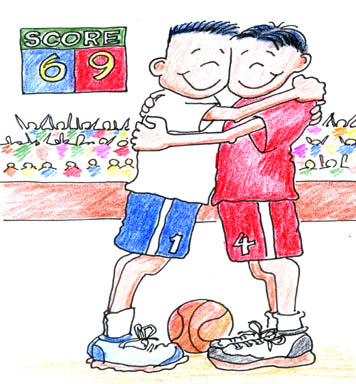RELATIONAL VIRTUE GROUP
Because I value others as those whom Christ created and redeemed, I choose to treat them as I would like to be treated.

RELATIONAL VIRTUE GROUP Because I value others as those whom Christ created and redeemed, I choose to treat them as I would like to be treated. |
|
| How To Treat People Peacemaker Some people argue and fight. Jesus found ways to help rather than quarrel. I should avoid quarreling and help other people to get along. |
|
I choose to treat others peacefully and to be a peacemaker.
|
Peacemaker related virtues: Balance, calming, contentment, gentle, moderation, trouble-stopper, racial equality, religious freedom, separation of church and state. Peacemaker means: one who reconciles people, one who quiets the troublemakers, one who brings about a truce, a "trouble stopper".
|
|
See flipchart Click the picture below:
|
"I've Got Peace Like a River" |
1. Girls are fighting over a backpack and both pulling
in opposite directions, a student is handing another backpack to them
so they will stop fighting.
|
James 3:17 Wisdom is peaceable “Christ's followers are sent to the world with
the message of peace. Whoever, by the quiet, unconscious
influence of a holy life, shall reveal the love of Christ; whoever, by
word or deed, shall lead another to renounce sin and yield his heart to
God, is a peacemaker.” MB 28
|
Teaching Your Children Values, p. 76, by Linda and Richard
Eyre
|
| Role-play: peacemaker between two factors in society. |
| PE: We play to win but with Jesus in our hearts we can remain peaceful and promote goodwill. |
| Social Studies: 1945 Axis made a peace treaty with allies. So Abigail made treaty with David. |
The Story of Ferdinand by Munro Leaf
Teaching Your Children Values, by Linda and Richard Eyre, Simon &
Schuster, 1993
Great Stories for Kids IV, by Jerry Thomas, PPPA, 1999
Uncle Arthur's Bedtime Stories, by Arthur S. Maxwell, R&H. 1964
Invisible Princess by Raith Ringgold
Treasury of Devotional Aids for Home and School by Department of Education
of General Conference of SDA, 1951
Sure as the Dawn by Mansell and Mansell, R&H, 1953
A Statement on Peace
One of the great political and ethical issues of our day is the question of
war and peace. It is both complicated and convoluted. Despair hovers around
us. Millions expect a nuclear holocaust without the basic hope of afterlife
or eternal life.
Today there is a new situation, unparalled in history. Human beings have developed
the means of humanity's own destruction, means that are becoming more and more
"effective" and "perfected"—although these are hardly
the right words. Since World War II, civilians are no longer just occasionally
or incidentally harmed; they have become the target.
Christians believe that war is the result of sin. Since the Fall of Man, strife
has been a perennial fact of human existence. "Satan delights in war. .
. . It is his object to incite nations to war against one another."—The
Great Controversy, p. 589. It is a diversionary tactic to interfere with the
gospel task. While global conflict has been prevented during the past forty
years, there have been perhaps 150 wars between nations and within nations,
with millions perishing in these conflicts.
Today virtually every government claims it is working for disarmament and peace.
Often the known facts appear to point in a different direction. Nations spend
a huge portion of their financial resources to stockpile nuclear and other war
materials, sufficient to destroy civilization as it is known today. News reports
focus on the millions of men and women and children who suffer and die in wars
and civil unrest and have to live in squalor and poverty. The arms race, with
its colossal waste of human funds and resources, is one of the most obvious
obscenities of our day.
It is therefore right and proper for Christians to promote peace. The Seventh-day
Adventist Church urges every nation to beat its swords into plowshares"
and its "spears into pruninghooks" (Isa. 2:4). The church's Bible-based
Fundamental Belief No. 7 states that men and women were "created for the
glory of God" and were "called to love Him and one another, and to
care for their environment," not to destroy or hurt one another. Christ
Himself said, "Blessed are the peacemakers: for they shall be called the
children of God" (Matt. 5:9)
While peace cannot be found in official church pronouncements, the authentic
Christian church is to work for peace between the first and second advents of
Christ. However, hope in the Second Coming must not live in a social vacuum.
The Adventist hope must manifest and translate itself into deep concern for
the well-being of every member of the human family. True, Christian action today
and tomorrow will not of itself usher in the coming kingdom of peace; God alone
brings this kingdom by the return of His son.
In a world filled with hate and struggle, a world of ideological strife and
of military conflicts, Seventh-day Adventists desire to be known as peacemakers
and work for worldwide justice and peace under Christ as the head of a new humanity.
This public statement was released by the General Conference
president, Neal C. Wilson, after consultation with the 16 world vice
presidents of the Seventh-day Adventist Church, on June 27, 1985, at
the General Conference session in New Orleans, Louisiana.
| Primary: Middle:
|